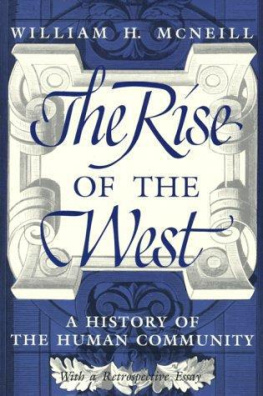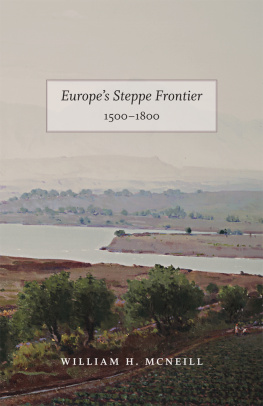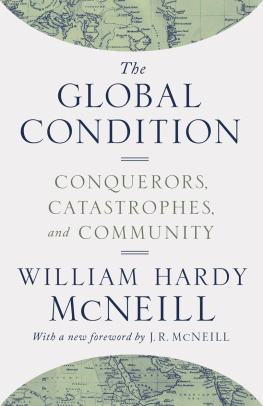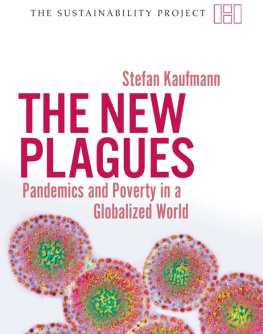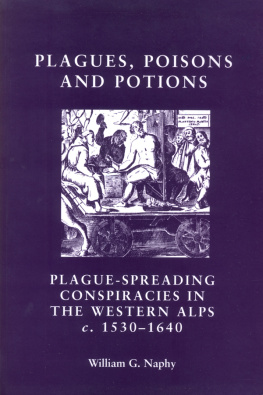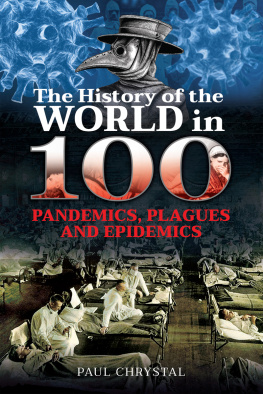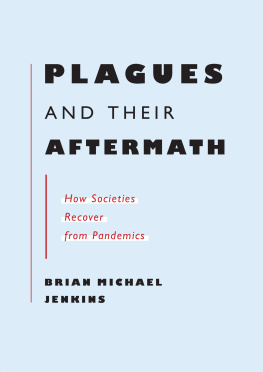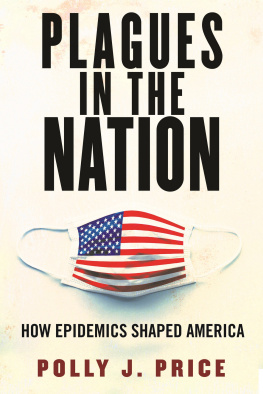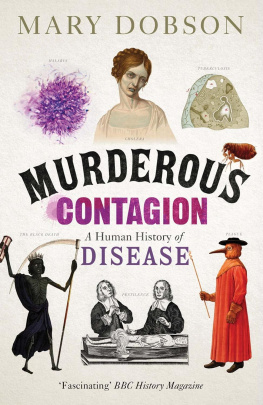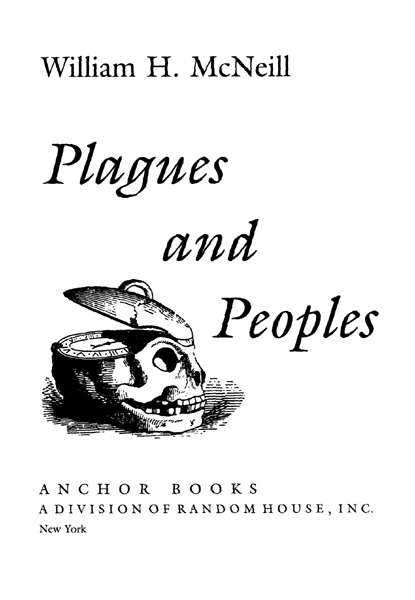Seldom in recent times has a new historical work drawn as much attention as P LAGUES AND P EOPLES , William H. McNeills account of the effects of disease on human history. Reviews included such comments as:
A very remarkable and original book. It is rewarding, immensely so, and well worth the effort.
Washington Post
P LAGUES AND P EOPLES , a glorious successor to T HE R ISE OF THE W EST , integrates ecology and demography with politics and culture on a vast scale. A brilliantly conceptualized and challenging scholarly achievement.
Kirkus Reviews
The volume provides fascinating reading and emphasizes a perspective on events that is not often found in the treatment of history. The reader, once started, will find it difficult to lay the book down. The book can be unhesitatingly recommended.
Tampa Tribune-Times
Far-reaching certain to provoke wide debate original and exciting.
Publishers Weekly
A brilliant book.
Cleveland Press
In P LAGUES AND P EOPLES , a fascinating exercise in historical speculation, William H. McNeill argues convincingly for the extraordinary impact of disease on human history.
The Progressive
The scholarship the author displays in this study is dazzling. P LAGUES AND P EOPLES is a very skillful work. It will fascinate and intrigue us.
Ithaca Journal
A brilliant and challenging thesis supported by fascinating examples.
New Tork Magazine
This is an important, original, and well-researched work.
Library Journal
Irresistible.
Boston Sunday Herald
University of Chicago professor William H. McNeill in his P LAGUES AND P EOPLES describes, with an impressive accumulation of evidence, the frequent and decisive role that disease has played in mans historical development.
Baton Rouge Sunday Advocate
[An] intriguing new interpretation of world history.
San Francisco Examiner
He does a commendable job in providing a surprising amount of the details of even sometimes overlooked epidemics and plagues.
Chicago Daily News
This amazingly detailed book certainly offers an insight into the disasters of nature which have swept the worlds population at one time or another.
Natchez Democrat
A novel study by a noted historian. With expert reinterpretation of past events, supported by scientific detail, McNeill makes a strong case.
American Library Association Booklist
Enlightening. P LAGUES AND P EOPLES definitely is recommended reading.
Grand Rapids Press
McNeill ably and in extremely scholarly fashion offers an impressive accumulation of evidence to demonstrate the central role of pestilence in human affairs and the extent to which it has changed the course of human history.
Jackson Clarion-Ledger/Daily News
ANCHOR BOOKS EDITIONS, 1977, 1989, 1998
Copyright 1976 by William H. McNeill
Preface copyright 1998 by William H. McNeill
All rights reserved under International and Pan-American Copyright Conventions. Published in the United States by Anchor Books, a division of Random House, Inc., New York, and simultaneously in Canada by Random House of Canada Limited, Toronto. Originally published in hardcover in the United States by Doubleday in 1977. The Anchor Books edition is published by arrangement with Doubleday, a division of Random House, Inc.
Anchor Books and colophon are registered trademarks of Random House, Inc.
The map, The Spread of the Black Death in Europe, is reprinted by permission of the Annales: Economies, Socits, Civilisations and appeared in the Annales, 17, in the article Autour de la Peste Noire: Famines et Epidmies dans lHistoire du XIVe Sicle, by Elizabeth Carpentier (1962, pp. 106292).
Library of Congress Cataloging-in-Publication Data
McNeill, William H.
Plagues and peoples / William H McNeill,
p. cm.
Reprint. Originally published: Garden City, N.Y.:
Anchor Press, 1976.
EpidemicsHistory. CivilizationHistory.
I. Title.
RA649.M3 1989 8927689
614.49dc20
eISBN: 978-0-307-77366-1
www.anchorbooks.com
v3.1
Contents
Acknowledgments
T his book was composed in the spring and sum mer of 1974 and corrected in the spring of 1975. In between, a rough draft was circulated to the following readers for their expert criticism: Alexandre Bennigsen, James Bowman, Francis Black, John Z. Bowers, Jerome Bylebyl, L. Warwick Coppleson, Alfred W. Crosby, Jr., Philip Curtin, Allen Debus, Robert Fogel, Ping-ti Ho, Laverne Kuhnke, Charles Leslie, George LeRoy, Stuart Ragland, Donald Rowley, Olaf K. Skinsnes, H. Burr Steinbach, John Woods. The manuscript also benefited from a panel discussion at a meeting of the American Association for the History of Medicine, May 1975, at which Saul Jarcho, Barbara G. Rosenkrantz, John Duffy, and Guenter B. Risse commented on what they had read. Subsequently, in the autumn of 1975, Barbara Dodwell read and Hugh Scogin worked over Chinese data for me; between them they led me to adjust the way I understand the propagation of the Black Death. Fortunately it proved possible to insinuate appropriate adjustments into the text at the last minute.
This episode illustrates how tentative many of the assertions and suggestions of this book are and must remain until epidemiologically informed researches have been undertaken in Chinese and other ancient records. Suggestions and corrections from the entire array of readers permitted improvement of the original version in numerous details and steered me away from some silly errors; but needless to say, I remain responsible for what appears below, including any and all residual errors.
A generous grant from the Josiah Macy, Jr., Foundation permitted time away from normal academic duties for the completion of this essay. I was assisted by Edward Tenner, Ph.D., who looked things up for me in European languages, and by Joseph Cha, Ph.D., who consulted Chinese and Japanese texts on my behalf and compiled the roster of Chinese epidemics that appears in the Appendix. Without their help the task would have taken longer and, in particular, my remarks about the Far East would have been far sketchier. Marnie Veghte twice typed the text with cheerful accuracy and admirable speed. Charles Priester of Anchor Press/Doubleday asked suitably pointed questions to provoke me to improve the original manuscript in important ways.
To all who thus assisted in bringing this book to birth, I am sincerely grateful.
W ILLIAM H. M C N EILL
15 December 1975
Preface
R eaders of a book about epidemic infections, like this one, are sure to wonder why it contains no mention of AIDS. The reason is simple. That disease was identified and named only in 198182, some six years after Plagues and Peoples was published. Since then, the AIDS epidemic has been a major driving force behind the continued interest in what this book has to say about earlier epidemics and human responses to them, and perhaps it is time to acknowledge that fact and say something about the disease that has attracted so much attention since it was first identified.
The climate of medical opinion has changed considerably since this book came out, for in 1976 many doctors believed that infectious diseases had lost their power to affect human lives seriously. Scientific medicine, they supposed, had finally won decisive victory over disease germs. Newly discovered antibiotics and relatively simple prophylactic and public health measures had at last made infections easy to prevent and cure. The World Health Organization actually succeeded in eliminating smallpox from the face of the earth in the same year this book was published, and optimists believed that other infections, like measles, might go the same way if sufficient medical effort were put into worldwide campaigns to isolate and cure each and every infection.


